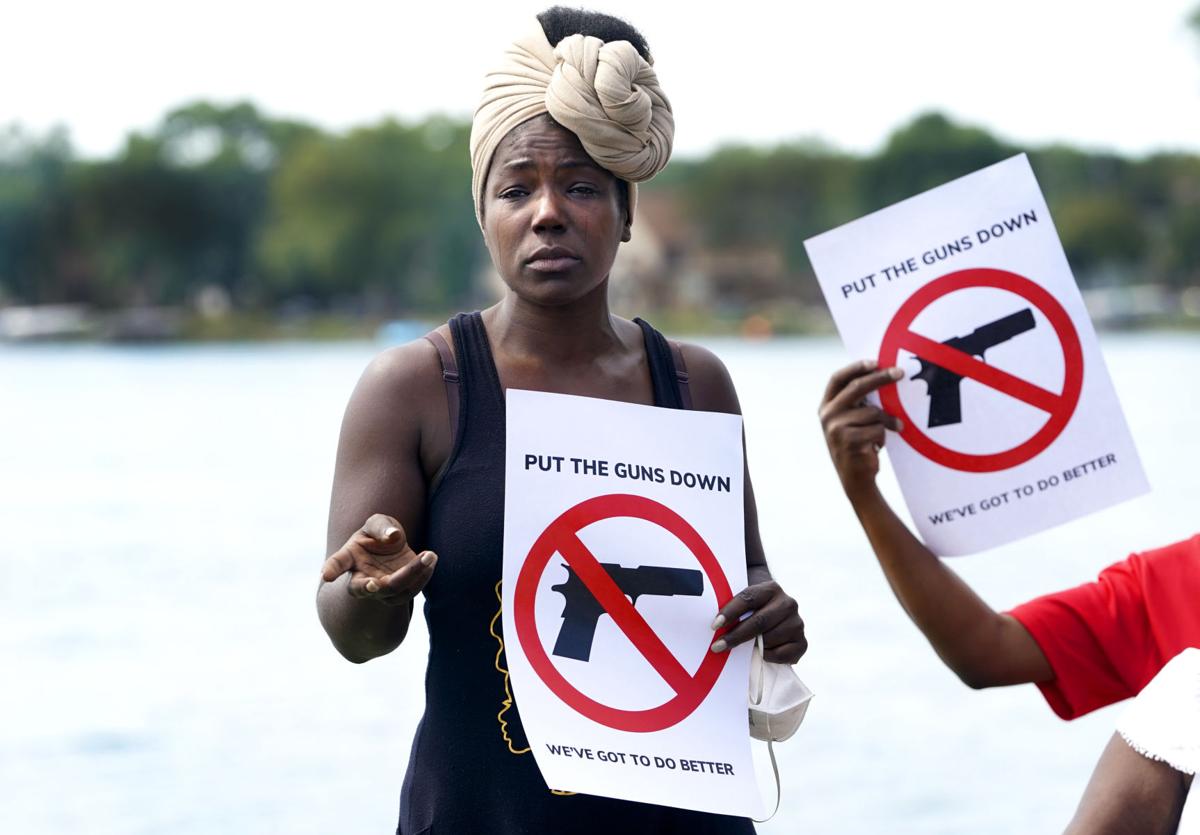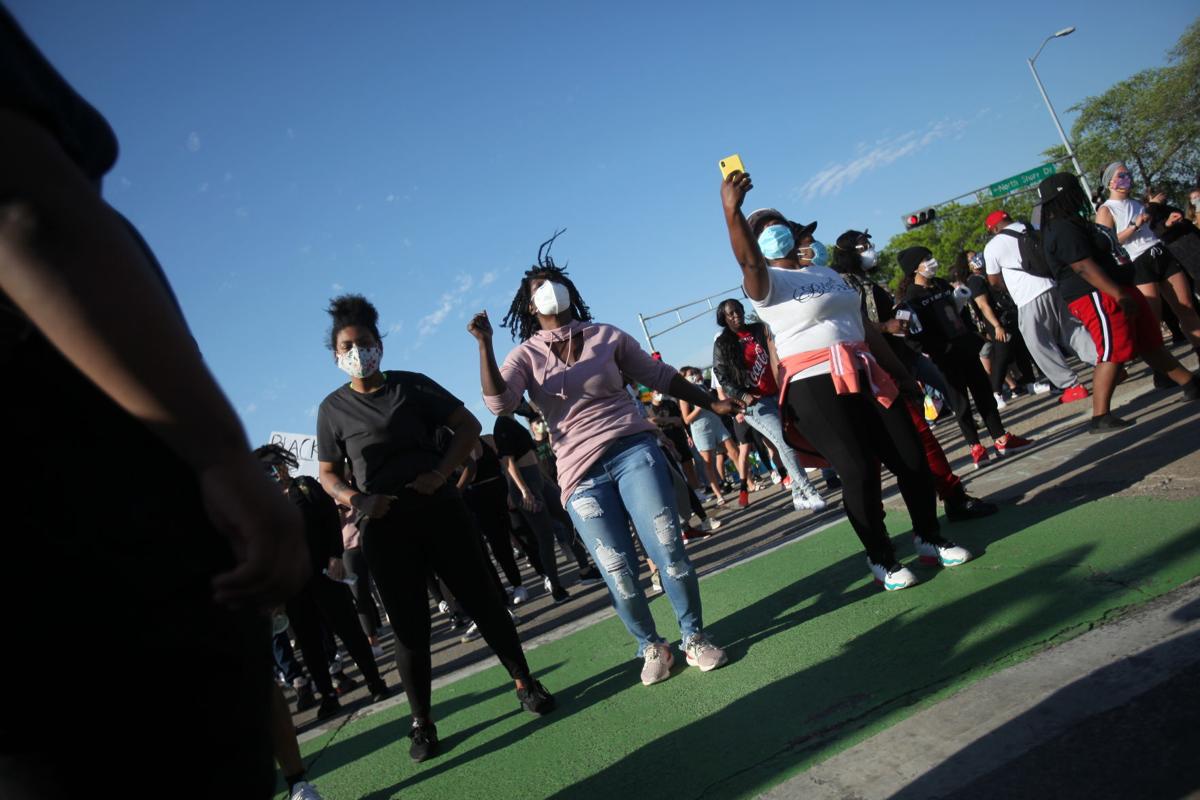
Wisconsin State Journal: "Know Your Madisonian: Activist Brandi Grayson says she's an 'agitator,' fighter for Black lives"
October 3, 2020
Emily Hamer | Wisconsin State Journal
Oct 3, 2020
Brandi Grayson says she never wanted to be an agitator.
“I wanted to fit in. I didn’t want to make people mad. I didn’t want to be the agitator. I didn’t want to be the disruptor,” said Grayson, founder and CEO of local nonprofit Urban Triage. “But in real life that’s just who I am. That’s who God made me to be. And when I was able to accept me, I became empowered.”
From organizing protests to calling out public officials at city meetings, disruption may be how many in Madison know Grayson best. It’s also one of the ways she makes her mark as an outspoken advocate for Madison’s Black community.

Brandi Grayson joins mourners at an August memorial in Brittingham Park for 11-year-old Anisa Scott, who died after a shooter fired into a car on Madison's East Side, striking Anisa in the head. Grayson has said Anisa was a victim of broken systems that impact Madison's Black community.
STEVE APPS, STATE JOURNAL
Her organization Urban Triage, along with local activist group Freedom Inc., organized most of Madison’s daytime protests against racism and police brutality following the death of George Floyd in Minneapolis police custody.
“The whole point of protests is to be as disruptive as possible,” Grayson said. “It’s like, ‘Hey, this is what’s happening, and you continue to allow this thing to happen which is destructive and disruptive of people’s lives. So now we need to bring awareness, so we’re going to disrupt you.’”
Protesters shut down the Beltline, John Nolen Drive and other major streets throughout Madison. They showed up outside the houses of elected officials, including Dane County District Attorney Ismael Ozanne and School Board President Gloria Reyes. They’ve also repeatedly filled State Street and Capitol Square chanting “Black Lives Matter,” “Whose Streets? Our Streets” and “If we don’t get it, shut it down!”
Grayson, 40, could be seen speaking to hundreds outside of the Dane County Jail, dancing to the “Cupid Shuffle” with a huge group during a John Nolen Drive shutdown and running ahead of a crowd of protesters to help direct them through a residential area and using a Walkie Talkie to coordinate with other organizers to keep people safe.
Behind the scenes, Grayson and other organizers from Urban Triage and Freedom, Inc. made sure each protest had a group of medics available, a security team, large banners to keep the crowd togethers and lots of supplies, including water, bull horn speakers, hand sanitizer and masks.
“It’s a lot of work,” Grayson said with a laugh.
Though disruptive, all of the protests organized by Freedom, Inc. and Urban Triage have concluded peacefully.

Brandi Grayson, center, joins protesters as they dance to the "Cupid Shuffle" while blocking traffic on John Nolen Drive in June.
EMILY HAMER, STATE JOURNAL
Grayson also consistently fights for Madison’s Black community on smaller stages.
At a recent City Council meeting, Grayson urged council members to pass police oversight measures to hold the city’s law enforcement accountable, something protesters have pushed for. She said voting in support would be to “do what’s right in the lives of Black people as they’re alive.”
“You and many other people that sit on this council are disconnected from the reality of Black people in Madison, who have to exist inside systems (that) don’t see their humanity,” Grayson said. “And it’s hard to continue to engage with systems while begging them to see you. To see you as a person. To see you deserving of life. To see you deserving of justice.”
In her work at Urban Triage, Grayson said she often has to unpack trauma and help Black individuals realize they are deserving of a good life. She said some start to “attach with the idea of Black inferiority,” and she tries to reverse those mindsets with the training she leads.
Urban Triage supports Black families by providing services for professional development, parent leadership, trauma response and economic empowerment, among other support programs.
One of the programs, Supporting Healthy Black Families, is in its fourth cohort. Grayson said she’s seen dozens of people’s lives transformed by the training.
“Folks have ‘aha moments’ and breakthroughs about themselves. ... Some people start businesses. We have some people running for office. We have people entering relationships, leaving long-term abusive relationships. We have people going into therapy with their family,” Grayson said. “That’s the most, like, humbling, amazing experience to be a part of with individuals.”
It seems like you are crazy busy. Whenever I talk with you, you’re juggling watching your son, and then you’re running around protests. What does your day-to-day look like?
My mornings are blocked off for me, meaning that I wake up probably at like 3:30 a.m., 4 a.m. I send out my daily tasks to my staff. Then I get up and do some meditation, and then I work out. I do a boot camp on Zoom.
Then my son usually wakes up. I usually fix him breakfast. I take the dog for a walk. And then at 8:30 a.m. I have an executive coach call. After that my meetings begin.
I’m in meetings from probably when the nanny gets here at 10 until probably about 3:30 p.m., 4 p.m. If I’m not doing that, I’m preparing for our workgroups.
And then in between meetings and things, I’m stopping with Messiah, having lunch with him. Messiah is my 4-year-old. Just making sure I’m intentional about pausing and spending a little time with him, even if it’s on the floor playing around, playing “Lion” because that’s his favorite game. He’s a lion, I’m a tiger.
How did you get your start in activism?
My activism work started at UW-Madison as part of my exposure to and involvement with Black Student Union. That was probably in 1997 or 1998.
And it kind of escalated in 2005 when Katrina happened. I played a huge part in Joining Forces for Families’ efforts to house folks who were involved in Katrina. We ended up getting a bus, organizing apartments, furniture, organizing all this stuff really quickly. That was my first kind of real exposure to overnight organizing.
What are some of the biggest things you want to see changed?
I would love for us to redefine humanity (in a way) that includes all of humanity. Because white supremacy is insidious in the way that the prototype for humanity is whiteness, which leaves everybody else out.
I dream of a day that we’re just all judged by our character. Where the prototype of humanity is no longer rooted in one race, but really the humanity of all of us, no matter your color. And it’s OK to be Black and it’s OK to be brown. And you’re not going to be judged differently because you’re dark.
What drives you to keep fighting for change?
The impact on other people. Even when it seems impossible, even when it seems like nothing’s going to change, there are folks who are watching. There are Black people who are empowered and inspired. And that is really what matters.
Even if change doesn’t happen in my lifetime, we’re the ripples. We’re the small ripples that one day will become tsunamis.